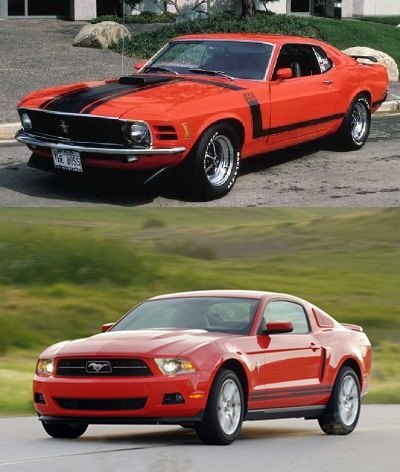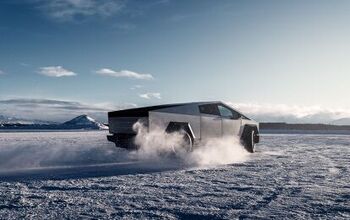1970 Mustang Boss 302 Vs 2011 Mustang V6: And The Winner Is…

The 1970 Mustang Boss 302 is a legend. Created specifically to compete against the Camaro z-28 in the Trans Am championship, the Boss 302 is a much rarer pony than its nemesis. Only 1628 were built in 1969 and 7013 in 1970. Its claim to fame was the unique pairing of the Windsor 302 block with the biggest Cleveland heads possible, the result rated (conservatively) at 290 hp. Somewhat surprisingly, CR bought and tested one in 1970. And since they just finished comparing the 2011 Mustang V6 against the Camaro, CR pitted the stats of the two against each other. Let’s just say that the forty years have brought some progress:
The little V6 makes more power, and scoots the 2011 down the road substantially faster. Now those test results from the Boss look a little slow compared to the commonly published figures of the times (0-60 in 6.9; 1/4 mile in 14.6 @98mph). But then the buff books didn’t buy their Bosses anonymously, like CR did. Anyway, the V6 still equals those numbers. And gets more than twice the mileage. The prices: similar too, adjusted for inflation, comparing a base 2011 to the Boss. And the 2011 gives you a the comforts that either weren’t available or extra in 1970: AC, power steering, music and a host of other creature comforts. Progress; although maybe not as much as some of us might have imagined in 1970. Predictions then would have had us all in electric cars long ago.

More by Paul Niedermeyer
Latest Car Reviews
Read moreLatest Product Reviews
Read moreRecent Comments
- W Conrad I'm not afraid of them, but they aren't needed for everyone or everywhere. Long haul and highway driving sure, but in the city, nope.
- Jalop1991 In a manner similar to PHEV being the correct answer, I declare RPVs to be the correct answer here.We're doing it with certain aircraft; why not with cars on the ground, using hardware and tools like Telsa's "FSD" or GM's "SuperCruise" as the base?Take the local Uber driver out of the car, and put him in a professional centralized environment from where he drives me around. The system and the individual car can have awareness as well as gates, but he's responsible for the driving.Put the tech into my car, and let me buy it as needed. I need someone else to drive me home; hit the button and voila, I've hired a driver for the moment. I don't want to drive 11 hours to my vacation spot; hire the remote pilot for that. When I get there, I have my car and he's still at his normal location, piloting cars for other people.The system would allow for driver rest period, like what's required for truckers, so I might end up with multiple people driving me to the coast. I don't care. And they don't have to be physically with me, therefore they can be way cheaper.Charge taxi-type per-mile rates. For long drives, offer per-trip rates. Offer subscriptions, including miles/hours. Whatever.(And for grins, dress the remote pilots all as Johnnie.)Start this out with big rigs. Take the trucker away from the long haul driving, and let him be there for emergencies and the short haul parts of the trip.And in a manner similar to PHEVs being discredited, I fully expect to be razzed for this brilliant idea (not unlike how Alan Kay wasn't recognized until many many years later for his Dynabook vision).
- B-BodyBuick84 Not afraid of AV's as I highly doubt they will ever be %100 viable for our roads. Stop-and-go downtown city or rush hour highway traffic? I can see that, but otherwise there's simply too many variables. Bad weather conditions, faded road lines or markings, reflective surfaces with glare, etc. There's also the issue of cultural norms. About a decade ago there was actually an online test called 'The Morality Machine' one could do online where you were in control of an AV and choose what action to take when a crash was inevitable. I think something like 2.5 million people across the world participated? For example, do you hit and most likely kill the elderly couple strolling across the crosswalk or crash the vehicle into a cement barrier and almost certainly cause the death of the vehicle occupants? What if it's a parent and child? In N. America 98% of people choose to hit the elderly couple and save themselves while in Asia, the exact opposite happened where 98% choose to hit the parent and child. Why? Cultural differences. Asia puts a lot of emphasis on respecting their elderly while N. America has a culture of 'save/ protect the children'. Are these AV's going to respect that culture? Is a VW Jetta or Buick Envision AV going to have different programming depending on whether it's sold in Canada or Taiwan? how's that going to effect legislation and legal battles when a crash inevitibly does happen? These are the true barriers to mass AV adoption, and in the 10 years since that test came out, there has been zero answers or progress on this matter. So no, I'm not afraid of AV's simply because with the exception of a few specific situations, most avenues are going to prove to be a dead-end for automakers.
- Mike Bradley Autonomous cars were developed in Silicon Valley. For new products there, the standard business plan is to put a barely-functioning product on the market right away and wait for the early-adopter customers to find the flaws. That's exactly what's happened. Detroit's plan is pretty much the opposite, but Detroit isn't developing this product. That's why dealers, for instance, haven't been trained in the cars.
- Dartman https://apnews.com/article/artificial-intelligence-fighter-jets-air-force-6a1100c96a73ca9b7f41cbd6a2753fdaAutonomous/Ai is here now. The question is implementation and acceptance.



































Comments
Join the conversation
It's kinda funny how people who savage modern near/mid luxury cars for not hitting 60 in 5.5 suddenly dismiss 0-60 times when they apply to cars they loved in their youth. My Saab 9-5 will rip the hell out of most '60s muscle cars - but no way in hell is it fast enough now.
That a V6 Mustang can even be compared to a Trans Am racing homologation special is testament to the march of technological progress. But since this is supposed to be "Truth About Cars" let me set the record straight on the Boss's performance or lack thereof. I owned two 1970 Boss 302s back when they were cheap used cars. They weighed in at 3,270 lbs. One was stock, the second the engine was modified to 400+ hp. Around town gas mileage was really bad, but not single digits, and on the highway they would do 20 mpg. Both cars had 3.50 gears. The stock car (minus rev limiter) would top out at 144 mph when it ran out of revs, as witnessed by the SC Highway Patrol. Quarter mile was easily in the fourteens, if you could get a good launch. 0-60 was no less than 7 seconds. Bottom end torque was not its strong point, because of the monster intake ports the powerband did not come in until 4,500 rpm, but then it screamed - definitely not slow and exciting and really fun to drive. The modified car revved to 7,000 rpm and would haze the tires at 70 mph, while the car was going sideways, scary fast. Again, in the stock car, I remember once beating a big block chevy Corvette in a street race and only losing by a car length to a Stage 1 Buick GS, from a roll-on. So, even stock it could hold its own. Great V6 Mustang - its performance is comparable to a vintage Boss 302, with better fuel economy, better handling (even if somewhat porky weight), without making your eyes burn from unburned hydrocarbons like the old one would. No need for revisionist history, though. I doubt in forty years people will pay big bucks for this latest technological gem, as they do today for the legendary Boss 302.